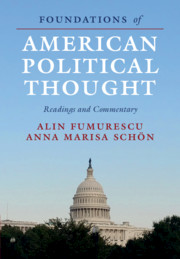Book contents
- Foundations of American Political Thought
- Foundations of American Political Thought
- Copyright page
- Contents
- Preface
- Acknowledgements
- 1 Introduction
- 2 Republicanism
- 3 Liberalism
- 4 The Puritans
- 5 Independence
- 6 The Positive Founding (I)
- 7 The Positive Founding (II)
- 8 The Whole and the Parties
- 9 People That Were Left Behind
- 10 The United States “Is”
- Index
- References
6 - The Positive Founding (I)
One People or Several Peoples?
Published online by Cambridge University Press: 09 July 2021
- Foundations of American Political Thought
- Foundations of American Political Thought
- Copyright page
- Contents
- Preface
- Acknowledgements
- 1 Introduction
- 2 Republicanism
- 3 Liberalism
- 4 The Puritans
- 5 Independence
- 6 The Positive Founding (I)
- 7 The Positive Founding (II)
- 8 The Whole and the Parties
- 9 People That Were Left Behind
- 10 The United States “Is”
- Index
- References
Summary
Chapter 6 deals with the question of American self-understanding after the Declaration of Independence—were they one people or many peoples?—and the framing of the state constitutions. The first part of the chapter offers substantial excerpts from the first constitutions of Virginia, Pennsylvania, and Massachusetts as well as critical examinations of these documents by contemporaries, including passages from Jefferson’s Notes on the State of Virginia and Benjamin Rush’s Observations on the Present Government of Pennsylvania. The selections reveal two fundamental problems to be decided by the state constitutional conventions: who was qualified to write a constitution and who should approve and ratify it—the people at large or the natural aristocracy? The second part of the chapter presents the Articles of Confederation and excerpts from related writings. The same confrontation between the principle of corporate representation and the principle of numerical majorities played out in the debates on the Articles of Confederation as delegates disagreed whether to emphasize the union or the states.
Keywords
- Type
- Chapter
- Information
- Foundations of American Political ThoughtReadings and Commentary, pp. 178 - 225Publisher: Cambridge University PressPrint publication year: 2021

